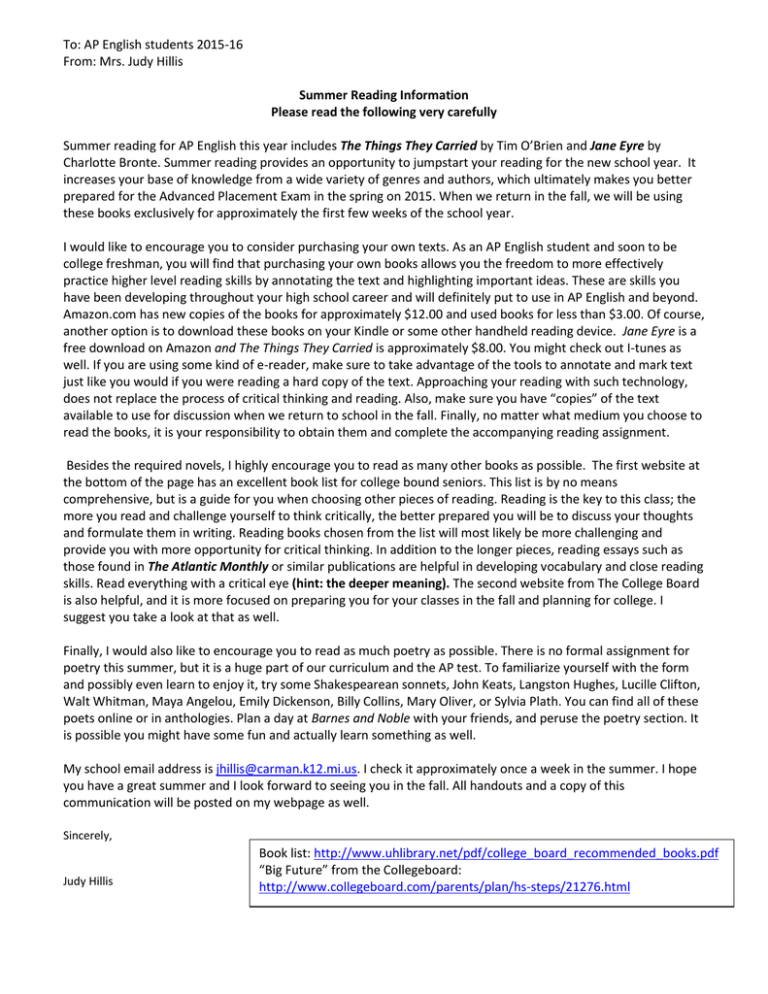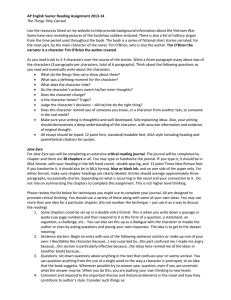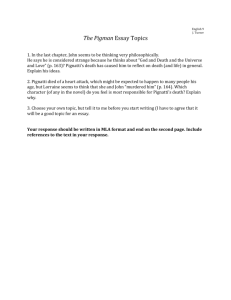Summer reading information and assignment - Carman
advertisement

To: AP English students 2015-16 From: Mrs. Judy Hillis Summer Reading Information Please read the following very carefully Summer reading for AP English this year includes The Things They Carried by Tim O’Brien and Jane Eyre by Charlotte Bronte. Summer reading provides an opportunity to jumpstart your reading for the new school year. It increases your base of knowledge from a wide variety of genres and authors, which ultimately makes you better prepared for the Advanced Placement Exam in the spring on 2015. When we return in the fall, we will be using these books exclusively for approximately the first few weeks of the school year. I would like to encourage you to consider purchasing your own texts. As an AP English student and soon to be college freshman, you will find that purchasing your own books allows you the freedom to more effectively practice higher level reading skills by annotating the text and highlighting important ideas. These are skills you have been developing throughout your high school career and will definitely put to use in AP English and beyond. Amazon.com has new copies of the books for approximately $12.00 and used books for less than $3.00. Of course, another option is to download these books on your Kindle or some other handheld reading device. Jane Eyre is a free download on Amazon and The Things They Carried is approximately $8.00. You might check out I-tunes as well. If you are using some kind of e-reader, make sure to take advantage of the tools to annotate and mark text just like you would if you were reading a hard copy of the text. Approaching your reading with such technology, does not replace the process of critical thinking and reading. Also, make sure you have “copies” of the text available to use for discussion when we return to school in the fall. Finally, no matter what medium you choose to read the books, it is your responsibility to obtain them and complete the accompanying reading assignment. Besides the required novels, I highly encourage you to read as many other books as possible. The first website at the bottom of the page has an excellent book list for college bound seniors. This list is by no means comprehensive, but is a guide for you when choosing other pieces of reading. Reading is the key to this class; the more you read and challenge yourself to think critically, the better prepared you will be to discuss your thoughts and formulate them in writing. Reading books chosen from the list will most likely be more challenging and provide you with more opportunity for critical thinking. In addition to the longer pieces, reading essays such as those found in The Atlantic Monthly or similar publications are helpful in developing vocabulary and close reading skills. Read everything with a critical eye (hint: the deeper meaning). The second website from The College Board is also helpful, and it is more focused on preparing you for your classes in the fall and planning for college. I suggest you take a look at that as well. Finally, I would also like to encourage you to read as much poetry as possible. There is no formal assignment for poetry this summer, but it is a huge part of our curriculum and the AP test. To familiarize yourself with the form and possibly even learn to enjoy it, try some Shakespearean sonnets, John Keats, Langston Hughes, Lucille Clifton, Walt Whitman, Maya Angelou, Emily Dickenson, Billy Collins, Mary Oliver, or Sylvia Plath. You can find all of these poets online or in anthologies. Plan a day at Barnes and Noble with your friends, and peruse the poetry section. It is possible you might have some fun and actually learn something as well. My school email address is jhillis@carman.k12.mi.us. I check it approximately once a week in the summer. I hope you have a great summer and I look forward to seeing you in the fall. All handouts and a copy of this communication will be posted on my webpage as well. Sincerely, Judy Hillis Book list: http://www.uhlibrary.net/pdf/college_board_recommended_books.pdf “Big Future” from the Collegeboard: http://www.collegeboard.com/parents/plan/hs-steps/21276.html Jane Eyre For Jane Eyre you will be completing an extensive critical reading journal. The journal will be completed by chapter and there are 38 chapters in all. You may type or handwrite the journal. If you type it, it should be in MLA format, with your heading in the left hand corner, double spacing, and 12 point Times New Roman font. If you handwrite it, it should also be in MLA format, blue or black ink, and on one side of the paper only. For either format, make sure chapter headings are clearly labeled. Entries should average approximately three paragraphs, occasionally shorter, depending on what is occurring in the novel and your connection to it. Do not rely on summarizing the chapters to complete this assignment. This is not higher level thinking. Many students use a composition notebook if they are writing it by hand. Please review the list below for techniques you might use to complete your journal. All are designed to promote critical thinking. You should use a variety of these along with some of your own ideas. You may use more than one idea for a particular chapter. (Do not number the technique – just use it as a way to discuss the reading) 1. A few chapters could be set up in a double entry format. This is when you write down a passage or quote (use page numbers) and then respond to it in the form of a question, a statement, an argument, a challenge, etc… You can also set this up as a dialogue with the character or maybe the author or even by asking questions and posing your own responses. The idea is to get to the deeper meaning. 2. Sentence starters: Begin an entry with one of the following sentence starters or make up one of your own: I like/dislike the character because…I was surprised by…this part confused me / made me angry because…this section is particularly effective because…the ideas here remind me of the ideas in [another book] because… 3. Questions: Jot down questions about anything in the text that confuses you or seems unclear. You can question anything from the use of a single word to the way a character is portrayed, to an idea that the book suggests. Whenever possible try to answer your question, even if you are uncertain what the answer may be. When you do this, you are pushing your own thinking to new levels. 4. Comment and respond to the important literary and rhetorical elements in the novel and how they contribute to author’s style. Consider such things as: Allusions Figurative language (metaphors, similes, etc…) Foreshadowing Tone/attitude Symbolism Patterns in sentence structure (syntax) Narration / diction Imagery Theme / thematic ideas Recurrent details Point of view Any other literary aspect that seems significant You may choose any or all of these ways of responding. Have confidence in yourself and your responses. Be willing to pose your ideas and support them. The main point is to think critically and engage in your reading. Vocabulary Study: One of the major issues that seems to impede students’ understanding of higher level reading material is an underdeveloped vocabulary. As a student in AP English, one of your responsibilities is to increase your vocabulary. You will need to sign up for Vocabulary.com shortly after the school year is finished. There is also an app, but it costs $2.99. When you join, create an account. Doing this allows you to take advantage of all of Vocabulary.com’s activities and exercises to improve your vocabulary. Even if you don’t sign up, you are required to go to the website listed at the end of this sentence to see the Jane Eyre vocabulary lists (http://vocab.com/lists/333634). Now, if you don’t create an account and you just go this site, you will be able to review vocabulary lists from all the chapters of the novel. Many are simple and should be no problem, but others are more complex and you will need to review them. There are tabs below the chapter lists. The first tab is “review” with the list of words and definitions. The second tab is “practice.” This quizzes you on the words and definitions out of context from the novel. Make sure to review all chapters. We will compile a list from these words when we return in the fall. It will behoove you to have studied it ahead of time because we won’t take time for that in class. A great way to learn these words is to use them in your writing, correctly of course. You might even want to highlight them or bold them in your journal, so you can show off to me your newfound vocabulary prowess. I highly encourage you do this. Literary terms: On the next page is a quizlet website for AP English literary terms that some wonderful teacher created and I copied. If you have never used quizlet before, I encourage you to browse the site and possibly create an account so you can create your own flashcards for not only AP English, but for other classes as well. However, you do not have to create an account to use this site. I have provided the web address for the list created. Over the summer, one of your tasks will be to visit this website and learn these words. It is set up as flashcards, but there are also games and assessments which can be helpful, too. I will most likely add some words to his over the summer, so make sure to check it out at least 2-3 times a week for a few minutes every day. Also, as you learn these terms, consider including them as a point of discussion in your Jane Eyre journal. Jhilz flashcards on quizlet: http://quizlet.com/_e8r47 If, for some reason, you cannot access quizlet, I have included a list of the 66 words on my website. I will update it, as I update the quizlet. In the right hand column just click on the link that says AP English Literary Terms Summer 2015. There will be a vocabulary test on these terms within the first two weeks of the new school year. The Things They Carried This essay must be typed in MLA format with a works cited page. Review the sites below. They tell stories and share pictures of the war in Vietnam. Some are historical based while others are more focused on the human factor. I would review these sites before, during, and after your reading of the novel. For your assignment, choose one of the pictures or stories and write a critical analysis of how this picture or story relates to the novel. The connection you see could be from a particular chapter (story) in the book, a particular character, maybe even a symbol or motif. It might even be a combination of the above. Be thorough and thoughtful in your discussion. Use specific quotes from the novel and the website if applicable. I trust your understanding of the term critical analysis. However, if you want a more technical explanation, this website does a good job defining and outlining what exactly a critical analysis is. Remember, it is your evaluation of the topic using support from the novel and visuals and or other “true stories” from the websites below. http://www2.southeastern.edu/Academics/Faculty/elejeune/critique.htm There is also a sample outline, but don’t feel tied to that. Your essay should have a beginning, middle, and end that clearly identifies the subject matter and the author and uses ample evidence to analyze and support his/her thinking. This is not a personal essay! That doesn’t mean that reflection about the subject and what moved you can’t be part of the analysis, but it does mean that this essay shouldn’t be peppered with unnecessary I’s and definitely not any you’s. Remember, you are the author of your essay. You do not need to state “I think, I believe, I feel…” Just say it! When you turn in your essay, attach a copy of the picture/s that inspired you and /or the story that you used to connect with the novel. Also, please complete your essay in google docs, so that it can easily be share with me and your classmates when you return to school. This essay should be 2-3 pages double spaced in MLA format. The following is a helpful website for anything to do with formatting your paper in MLA style to grammar and writing questions (https://owl.english.purdue.edu/owl/resource/747/01/.). Please create a works cite page in MLA format that includes the novel and the websites you used for your picture/s and/or text. Teaching with Documents: “The War in Vietnam—A Story in Photographs” – go to the bottom of the page and click on the photos and other documents listed under “documents.” http://www.archives.gov/education/lessons/vietnamphotos/ Viet Nam War Overview http://vietnam.vassar.edu/overview.html This site presents an historical overview of the Viet Nam War by Robert Brigham, highlighting key events, historical documents, and links. Vietnam Veterans Memorial – good video and other explanatory materials http://www.nps.gov/vive/ Photo Essay of Vietnam War http://www.vietnampix.com/index.html Experiencing War: Stories from the Veterans History Project http://www.loc.gov/folklife/vets/stories/ex-warhome.html Note: If you find other credible sites you would like to use, please feel free to do so. However, make sure to include them on your works cited page. NOTE: ALL OF THE INFORMATION ON THE PREVIOUS TWO PAGES INCLUDING THE LETTER IS AVAILABLE ON MY WEB PAGE. CHECK THE LEFT SIDE MENU AND NEAR THE BOTTOM CLICK ON THE LINK FOR THE SUMMER READING INFORMATION.





